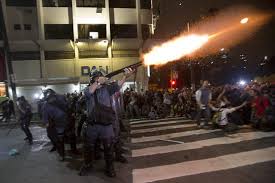February 24 – Public demonstrations in Sao Paulo, Brazil, again turned violent this weekend with police moving in swiftly to disperse rioters. The protest started peacefully with about 1,000 people, but the police stepped in when protestors set barricades alight and started smashing shop windows.
The protests were again about poor public services and related to the costs of hosting the 2014 World Cup and the 2016 Rio Olympic Games.
The number of people protesting was far below the mass protests seen last June at the Confederations Cup, but the protests have gained a hardened political edge with the violence at the weekend being attributed to the Black Bloc anarchist group.
The anarchists mainly targeted banks in the Sao Paulo business district and then clashed with police who used tear gas and stun grenades to disperse them. A number of arrests were made, including some journalists according to daily O Estado de Sao
Paulo.
The public concern over the cost of the World Cup build in comparison to the spend on public services has been criticised across all sectors of Brazilian society. There has also been widespread concern about the level of corruption within Brazil’s government and the administration of the funds for development.
Public feeling is that the $11 billion being spent on hosting infrastructure should have been invested in the larger priorities of health and education. Transport has also been cited as requiring more investment, though a portion of the World Cup spend is going towards transport infrastructure.
The demonstrations last June were triggered by increases in transport fares, and escalated from that point. A further round of fare rises earlier this month caused renewed anger and at a protest in Rio, February 6, a television cameraman died after being struck in the head by a flare thrown by a protestor.
While the protests have continued on a considerably smaller, though proportionally more violent scale, than last summer, a number of polls are showing that the majority of the Brazilian population back the hosting of the World Cup. The government insists that the country will benefit economically from staging the World Cup.
Contact the writer of this story at moc.l1745308744lbtoo1745308744fdlro1745308744wedis1745308744ni@no1745308744slohc1745308744in.lu1745308744ap1745308744

